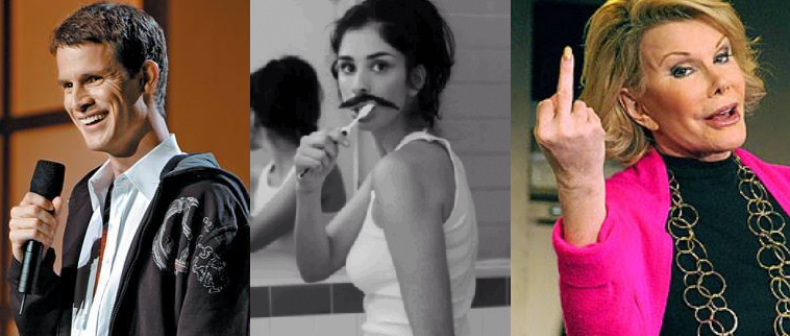
It’s fairly obvious that people find different things funny. How we use humour has been on my mind, as our culture continually negotiates its fair use. There was a lot of attention when popular American comedian Daniel Tosh allegedly joked in his live stand-up act about a female audience member potentially getting raped by five men.
Defenders felt it was within free speech, and, more importantly, part of the self-mythologizing of how comics push social boundaries. (For more on this, read Ivor Tossell’s excellent piece in the Globe on raising the bar for tolerable humour–an inspiration for this essay). Others felt the joke was insensitive to women and rape victims and, worse for someone whose profession is to make people laugh, just not funny.
I’m a firm believer in free speech. Too often, when society dictates what we can and cannot say, it reeks of classism, with those in power carving out the definitions of properness. Think, for example, of the language women are supposed to use in polite company, a gilded cage of domesticity and submission.
Legendary comic Joan Rivers talks about the role of women in New York Magazine, saying:
“When I am onstage, I am every woman’s outrage about where they put us,” she tells the writer. “We have no control. And that’s why I am screaming onstage. We have no control! I am furious about everything. All that anger and madness comes out onstage.”Humour acts as a torch in the darkness of taboo, providing us an opportunity to question the reasonability of keeping a subject forbidden–we must guard against becoming like the populous in Harry Potter, paralyzed by fear of even saying a name. I’m reminded of a scene from the Joan Rivers documentary A Piece Of Work, recalled nicely in the New York Magazine profile:
“In the film there is a scene where Rivers is playing some lousy casino in Wisconsin, and she does a bit about Helen Keller and a man stands and bellows, ‘It’s not very funny if you have a deaf son!’ Rivers lets him have it. ‘Oh, you stupid ass, let me tell you what comedy is about … ‘‘You go ahead and tell me what,’ he says.
‘Oh, please,’ she says. ‘You are so stupid. Comedy is to make everybody laugh at everything, and deal with things, you idiot.’
At Sundance, an interviewer asks her about the moment. ‘If you laugh at it, you can deal with it, and if you don’t, you can’t deal with it. And don’t start telling me that I shouldn’t be saying it. That’s the way I do it. I would have been laughing at Auschwitz.’”
With time, all things must become ripe for humour, an antiseptic from being weighed down by the bleakness of life, a covenant between one another that even the worst things are survivable.
When humour is directed senselessly, shifting from those with control to those without, its constructivity goes awry. Beyond the fine line between teasing and bullying is victimization, something the collective internet often forgets in a knee-jerk drive for junk-food stimulation. Online culture is at once as satisfied to make fun of hapless everyday people (think the infamous Star Wars Kid) as it is to self-righteously defend them (like Karen Klein, the bullied elderly bus monitor). As honesty without compassion is cruelty, humour without context is base.
The absence of context is what makes the Tosh joke indefensible. You can’t label anything a joke with the expectation of quieting all opposition–it just doesn’t work that way. A joke about rape that has no context is not a joke at all, it becomes a threat. An act of silencing.
Assuming the account of the incident is true (Tosh has apologized, but claimed he was misquoted), Tosh wasn’t skewering the vicious rape culture that shifts blame from the perpetrator to the victim. He wasn’t using humour to help “deal with things,” as Rivers put it. He didn’t shine a new light on the idea of women being sexually assaulted. Instead, he taunted her from the comfortable distance of the stage to turn the audience against her, because he didn’t have (or didn’t bother with) anything smarter to say.
Contrast this with the controversial joke Sarah Silverman made in the film The Aristocrats. The Aristocrats is a joke told by comedians to push the limits of acceptable discourse. The set-up is simple: a pitch to a booking agent for a family in a travelling circus art. What happens after can be pure beauty, as the joke teller spins the most lewd and disgusting acts known to society into the act, before landing on the punchline: “So what do you call such an act?” asks the booking agent. “The Aristocrats,” of course, is the answer.
Silverman tells, completely straight-faced, the story of how she was an original Aristocrat, describes a series of orifice-related acts, before going quiet and claiming a beloved comedian raped her. The moment is shocking, yet also very funny. The audience knows rape itself isn’t funny and Silverman isn’t making light of coming forward.
She signals the power struggle central to rape, by setting the joke in show business with its too-casual stories of the casting couch. Silverman confronts the audience – and her fellow comedians – with the social culture of not believing victims: we can safely place the other jokes of incest and fringe sex acts into the land of the (mostly) imaginary, but do we too quickly do the same for rape? In a joke that is supposed to push boundaries, why does rape feel off-limits, and should it? Shouldn’t we encourage unleashing the anger and madness Rivers mentioned, rather than making it forbidden?
What Tosh (or more likely, his supporters) can’t see is how the culture of privilege for an affluent straight white male makes it easy for him to casually toss off a rape joke or two. We live in a world where the origin story of tough-as-nails videogame icon Lara Croft includes narrowly being raped as a way of making her more relatable to players. When people defend creative decisions like this, I wonder if they’d be as similarly supportive if, say, the next time they reboot Batman the same thing happens to Bruce Wayne.
In an interview with National Post, Bob Saget thinks Tosh may have meant well, but flubbed the execution (partially explaining Tosh’s excuse that he was misquoted): “[T]he things that I say that are the most irreverent, that are the most upsetting things, I’m saying them because they upset me so much. I’m not saying them because I’m sanctioning them, and I think what’s lost in all the translation is, sometimes the performance doesn’t read the sarcasm that’s intended, or the irony.”
Maybe Tosh winkingly joked about rape to highlight how some men assert dominance. Maybe that’s why he purposefully picked a large number – five guys – of rapists, to exaggerate the smallness of the male ego. Maybe he said it in a way that didn’t translate into words, similar to how Sarah Silverman juxtaposes kewpie-pie voices with vulgarity. We just don’t know.
And yet, I don’t want Tosh to apologize for making rape jokes–instead, I want him to apologize for making bad rape jokes. After all, censoring Tosh won’t do any good, except turn him into a martyr, the defiant king of shit mountain. Rest assured that he’s not the last comic to unleash a rape joke. Many won’t be as well-intentioned as Saget believes. There is a line-up of fools behind Tosh who won’t apologize as quickly and will slip under the radar in a way Tosh couldn’t.
Luckily, humour cuts both ways. Apparently, on the same day Tosh made his joke about rape, Silverman did a show too. (The internet tends to enjoy coincidences like this, even if they’re slightly fudged, but even if it wasn’t the same night what Silverman says is dead-on.) In her act, she has a bit on rape jokes that pinpoints exactly why Tosh’s joke is so cowardly: traditionally, rape victims are pressured to remain silent, so a rape joke is the easiest to make since no one will complain. She makes every word count, and not only is she right, but, more importantly, she gets the laugh too.
________
Jaime Woo is a Toronto writer and the author of the upcoming book Gaming Grindr. Follow him on Twitter at @jaimewoo.
For more, follow us on Twitter: @torontostandard, and subscribe to our Newsletter.














